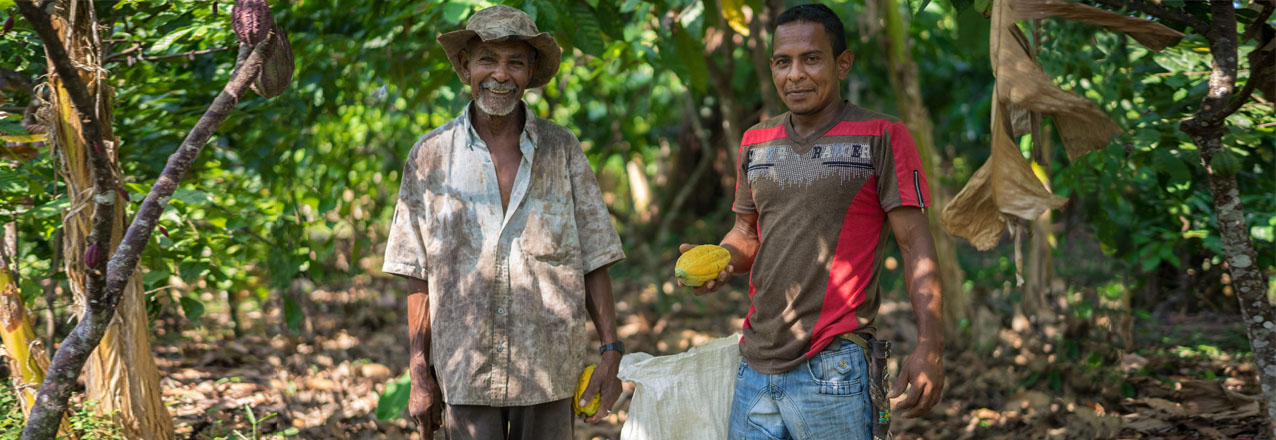With the increasing global demand for chocolate, maintaining optimal cocoa productivity is critical. For the Government of Ghana, unlocking barriers to cocoa productivity could bring significant economic growth opportunities.
Cocoa production is fundamental to Ghana’s economy. Cocoa is Ghana’s chief agricultural export and main cash crop (accounting for more than 9 percent of agricultural GDP), and the cocoa sector employs approximately 800,000 farm families.
Yet, despite significant investments, cocoa production in Ghana does not meet market expectations. Ghana’s cocoa productivity still trails that of other cocoa producing nations, such as Cote d’Ivoire and Indonesia, and as worldwide demand for cocoa increases, Ghana’s cocoa supply is not keeping pace with growing demand.
Why is cocoa production lagging behind, despite massive investment by the private sector as well as by the government? The answer may lie partly with the land tenure insecurity faced by Ghana’s cocoa farmers, many of whom work as sharecroppers on land held by absentee landlords and urban elites.
In April 2015, USAID’s Land Office teamed up with the World Cocoa Foundation (WCF) and the Ghana Cocoa Board (Cocobod) to investigate the relationship between land tenure security among Ghana’s cocoa farmers and overall cocoa productivity. The team’s findings have been memorialized in the tripartite USAID-WCF-Cocobod report: Assessment of Land Tenure-Related Constraints to Cocoa Productivity in Ghana.
The team found a strong correlation between insecure land tenure arrangements and reduced farm productivity, particularly related to ineffective on-farm investments, replanting of old and diseased cocoa trees, and the insufficient understanding of sustainable agroforestry methods. Cocoa farms are often unmapped and farmers lack land documentation. Tenant farmers lack written contractual arrangements with landowners and are hesitant to replant old or diseased cocoa trees for fear that by cutting down the tree they would relinquish their access to the land it stands on.
Given these uncertainties, and in the context of increasing pressures on land in Ghana, farmers do not feel empowered to make on-farm decisions aimed at boosting productivity. That, in turn, has led to declining health in cocoa farms: old and diseased trees are not cut down and replaced; trees are not properly pruned; and fertilizer is misapplied.
For the cocoa industry, which is racing to meet increasing global demand for chocolate, addressing barriers to productivity is critical. For the Government of Ghana, unlocking the productivity puzzle can mean significant economic growth opportunities.
With these motivations factors in mind, the team put forth a series of joint recommendations aimed at better understanding, and addressing, land tenure insecurities affecting Ghana’s cocoa farmers. The recommendations include supporting further household-level research aimed at understanding the land tenure arrangements and tenure-related constraints within Ghana’s cocoa sector; consolidating existing cocoa farm data onto a single, easily accessible and open map; and documenting landowner-tenant contracts through a simple, flexible template, paired with farmer-landowner education on the benefits of documenting tenancy arrangements. These recommendations are expected to incentivize cocoa farmers to invest in productivity-boosting measures as well as sustainable agro-forestry methods, ultimately boosting Ghana’s cocoa productivity while improving rural livelihoods.
USAID, the Cocoa Research Institute of Ghana, and WCF are already working on the first recommendation – supporting the expansion and completion of a baseline survey aimed at better understanding tenure arrangements and constraints among cocoa farmers. The results of this survey will be publicly available and can further inform future cocoa value chain management decisions.
For USAID’s Land Office, the partnership with WCF and Cocobod presents an exciting new opportunity to collaborate with the private sector to influence responsible agro-forestry practices and productivity gains, while at the same time meeting USAID development objectives related to equitable tenure security, food security, and economic growth.


